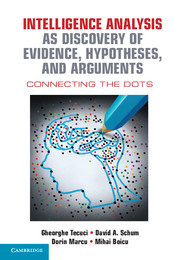Book contents
- Frontmatter
- Contents
- Preface
- Acknowledgments
- About the Authors
- 1 Intelligence Analysis: “Connecting the Dots”
- 2 Marshaling Thoughts and Evidence for Imaginative Analysis
- 3 Disciple-CD: A Cognitive Assistant for Connecting the Dots
- 4 Evidence
- 5 Divide and Conquer: A Necessary Approach to Complex Analysis
- 6 Assessing the Believability of Evidence
- 7 Chains of Custody
- 8 Recurrent Substance-Blind Combinations of Evidence
- 9 Major Sources of Uncertainty in Masses of Evidence
- 10 Assessing and Reporting Uncertainty: Some Alternative Methods
- 11 Analytic Bias
- 12 Learning and Reusing Analytic Expertise: Beyond Disciple-CD
- Glossary of Terms
- References
- Appendixes
- Index
12 - Learning and Reusing Analytic Expertise: Beyond Disciple-CD
Published online by Cambridge University Press: 05 August 2016
- Frontmatter
- Contents
- Preface
- Acknowledgments
- About the Authors
- 1 Intelligence Analysis: “Connecting the Dots”
- 2 Marshaling Thoughts and Evidence for Imaginative Analysis
- 3 Disciple-CD: A Cognitive Assistant for Connecting the Dots
- 4 Evidence
- 5 Divide and Conquer: A Necessary Approach to Complex Analysis
- 6 Assessing the Believability of Evidence
- 7 Chains of Custody
- 8 Recurrent Substance-Blind Combinations of Evidence
- 9 Major Sources of Uncertainty in Masses of Evidence
- 10 Assessing and Reporting Uncertainty: Some Alternative Methods
- 11 Analytic Bias
- 12 Learning and Reusing Analytic Expertise: Beyond Disciple-CD
- Glossary of Terms
- References
- Appendixes
- Index
Summary
INTRODUCTION
The Disciple-CD system provided with this book is a very general cognitive assistant for an end-user analyst who has no knowledge engineering experience and no access to or support from a knowledge engineer. However, Disciple-CD was created as a limited customized version of a more powerful system, called Disciple-EBR, a learning agent shell for evidence-based reasoning (Tecuci et al., 2013b; 2016). With Disciple-CD, the end-user can only access those modules of Disciple-EBR that can be used without any assistance from a knowledge engineer.
If, however, an organization can (occasionally) provide some knowledge engineering support to its analysts, then it can use Disciple-EBR, which has much more powerful reasoning and learning capabilities. Disciple-EBR has been trained with general knowledge for evidence-based reasoning, which is also used by Disciple-CD. But Disciple-EBR can be further trained by an expert analyst (with limited knowledge engineering support) on how to analyze complex hypotheses in a given intelligence analysis domain. The resulting cognitive assistant can then be used by a typical analyst to analyze hypotheses rapidly from this intelligence analysis domain. During its use, the system continues to learn from its user.
A trained Disciple-EBR system will significantly reduce the time required to perform an analysis, which will also have an improved quality. Indeed, developing an argumentation to assess a hypothesis will be much faster because the system will automatically retrieve and apply previously learned argumentation fragments. Moreover, the resulting argumentation will be more complete and more correct because it will incorporate vetted analytic fragments learned from expert analysts.
The development of cognitive assistants for evidence-based reasoning with a tool such as Disciple-EBR is presented in detail in Tecuci et al. (2016). In this chapter, we will provide only a general description of this process that could result in significantly more powerful cognitive assistants than Disciple-CD, for a wide variety of evidence-based reasoning domains besides intelligence analysis, such as forensics, cybersecurity, medicine, law, and any branch of science (physics, chemistry, etc.).
- Type
- Chapter
- Information
- Intelligence Analysis as Discovery of Evidence, Hypotheses, and ArgumentsConnecting the Dots, pp. 225 - 238Publisher: Cambridge University PressPrint publication year: 2016

